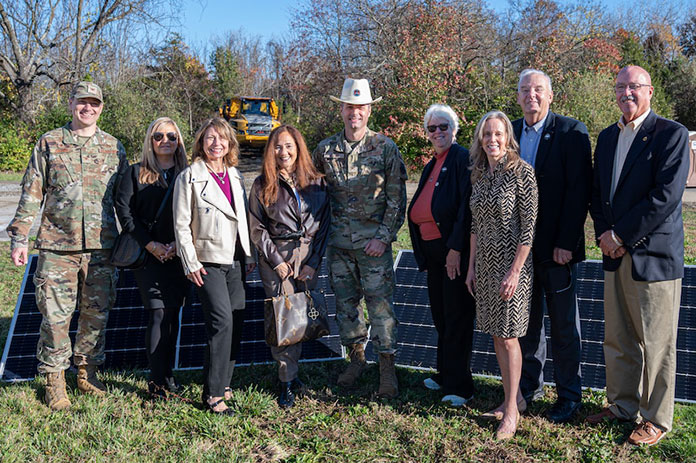
JOINT BASE MCGUIRE-DIX-LAKEHURST – A groundbreaking ceremony was recently held at the base for a new, $140 million project designed to enhance JBMDL’s mission capability and resiliency through critical energy infrastructure additions and upgrades.
Under this Energy Savings Performance Contract (ESPC), the U.S. Air Force has partnered with Ameresco, Inc. on a two-phase project. Once completed, it is estimated to generate $5.9 million in annual energy savings and reduce energy usage by 22%. It also aligns with federal policy objectives including Executive Order 14057, the Climate Smart Building Initiative, and the Department of the Air Force Climate.
Phase 1 includes 18 MW of rooftop solar and will complete construction this fall. Phase 2, the focus of the groundbreaking, will consist of an additional 13.7 MW of solar, 2MW/4MWh of battery storage, a microgrid control system, energy infrastructure and distribution upgrades, and building efficiency improvements.
The November 3 ceremony featured representatives of JBMDL and Ameresco (an energy infrastructure company) and was held at 595-999 E Main Street, Wrightstown, just outside the security perimeter.
“On the heels of Manchester Township being awarded the Bronze Level certification from Sustainable Jersey, we are ecstatic to see Joint Base MDL advancements in more robust sustainable energy projects,” Manchester Mayor Robert Hudak said.
“As a neighboring community, Manchester is proud to be home to one of the largest military and veteran populations in the state,” he added.
Mayor Hudak concluded by stating that, “having these large investments near our community creates a path to longevity and sustainability for our Joint Base Community, as well as Manchester Township, and it speaks to the continued longevity of the base being an economic driver in our region.”
“Today’s groundbreaking ceremony illustrates the value, importance and vibrancy of Joint Base McGuire-Dix for security missions and programs,” Jackson Mayor Michael Reina said. “We’re grateful for the continual investment in the Joint Base and proud to support our military leaders and the on-going operations at this facility.”
The most noticeable improvement is the installment of ground mounted solar arrays by the McGuire gate and between multiple hangars at Lakehurst. The ground mounted solar arrays are more cost-effective than grid supplied electric power, produce cleaner power and help meet Federal renewable energy goals. This addition will enhance energy security, resiliency and mission assurance from the increased supply of on-site power generation.

The contract includes the installation of a microgrid control system which will maintain the power of critical facilities even if commercial electrical power is lost. This is made possible by a battery energy storage system that acts as a giant uninterruptible power source and on-site natural gas fired generators.
Alexander Vincent, 787th Civil Engineer Squadron Chief of Energy said, “an attack or disruption on the electric could be a near peer adversary but the microgrid won’t allow that to breach our operations. Our critical buildings will still be fully operational, displaying how our resiliency has increased while responding and recovering from a disruption.”
A multitude of infrastructure and electrical advancements will be happening by leveraging new technologies. Over 300,000 new light-emitting diode fixtures will be installed along with an exterior smart city lighting controls system. The LED fixtures will increase light quality, reduce the cooling load throughout the base and automatically turn off lights that aren’t needed. Heating, ventilation and air conditioning performance will be improved, as well as an upgrade of existing transformers, increasing power quality and efficiency. These advancements allow for reduction of electrical losses, as well as operating and maintenance costs.
Vincent added, “it’s not just about generating our own electricity, it’s also about reducing how much we use. We’re not increasing greenhouse gas-emissions, which have other effects that we as a joint base would have to deal with.
“This entire project is paid for by the savings it generates,” he said.







